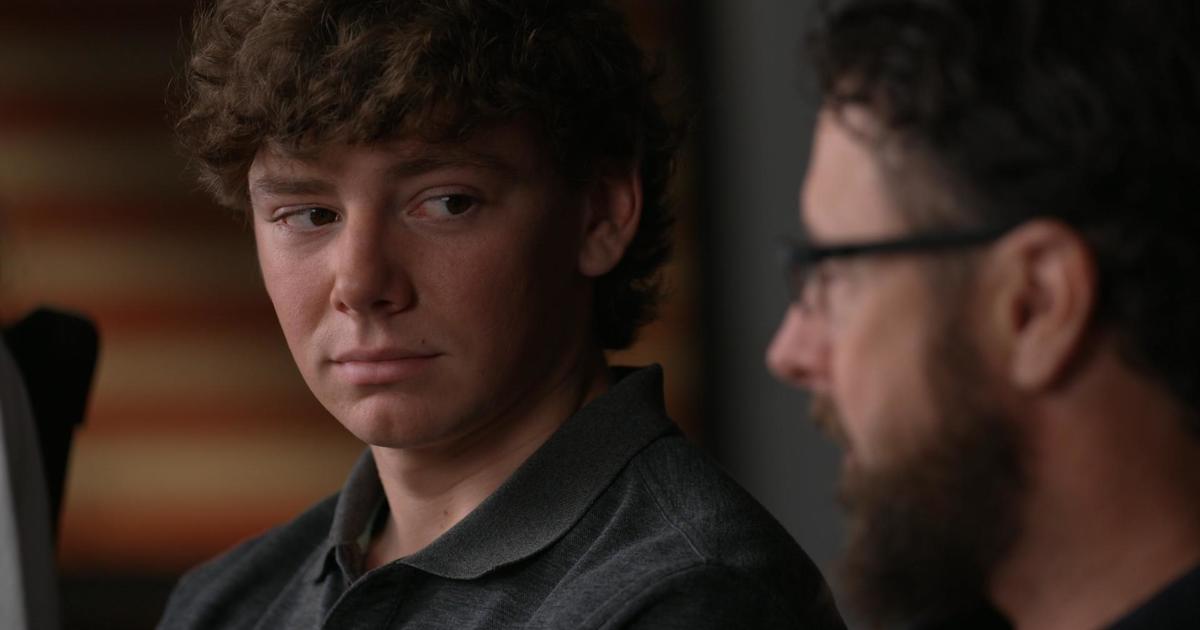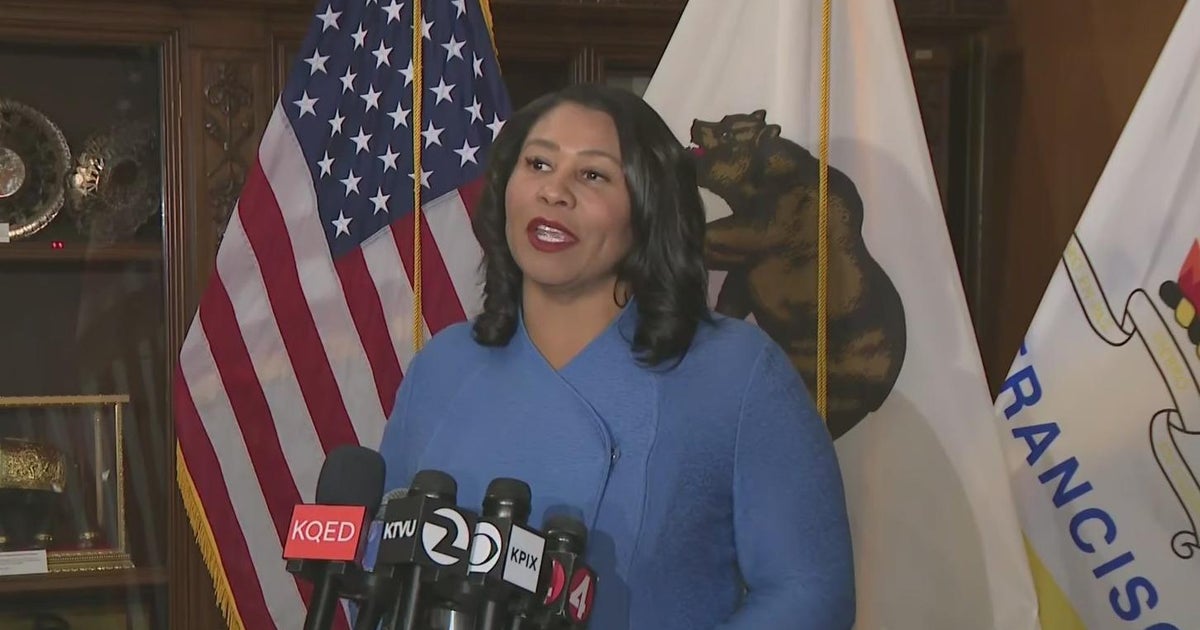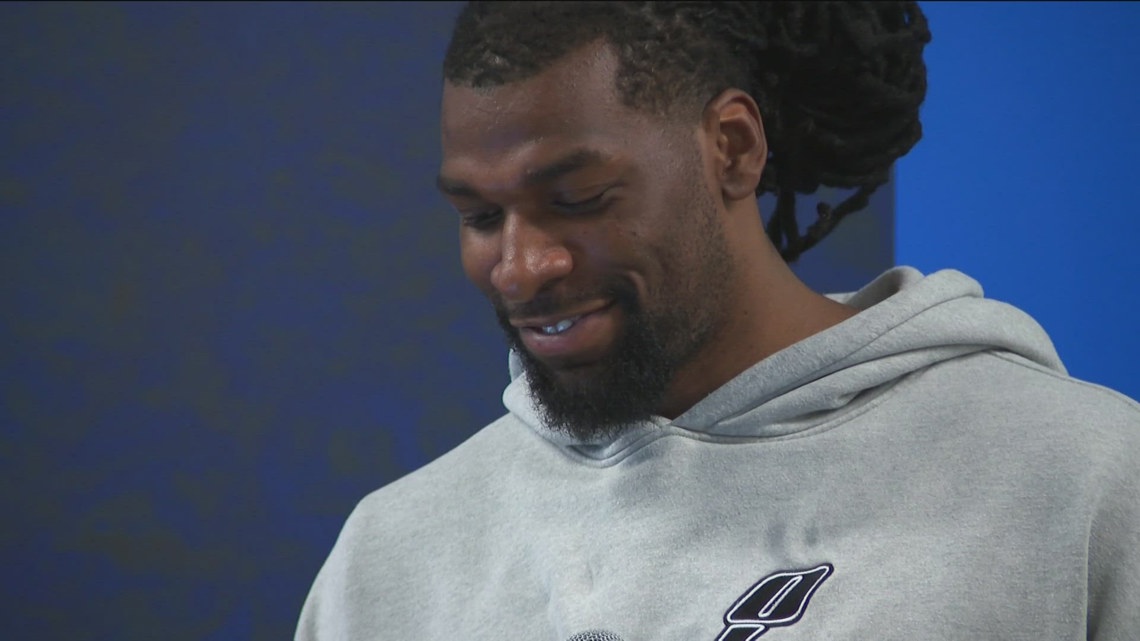CBS News
How some children living in the homes of wounded warriors become family caregivers

Two million Americans served in Afghanistan and Iraq. And at least 600,000 have been diagnosed with post-traumatic stress disorder. For the most part, the U.S. is doing better recognizing and treating these wounded warriors. But less well known are millions more who are in need but remain hidden. They are the children living with injured veterans. In a profound sense, PTSD can be contagious. Many children have become caregivers confronting depression and fear. And you will hear tonight that the stress can be so great it can lead to attempts of suicide. You’re about to meet two courageous families who spoke to us so that others can know that help is on the way for America’s children of war.
In 2011, Chuck Rotenberry was a Marine on patrol in Afghanistan when an improvised landmine detonated a few feet away.
Chuck Rotenberry: Which sent me down a hill 20, 30 feet, knocked me out– caused catastrophic injuries to the Marine behind me and the Marine behind him.
It was Rotenberry’s second combat tour, after Iraq.
Scott Pelley: What happened to the Marine behind you who had stepped on the IED?
Chuck Rotenberry: He lost both his legs above the knee.
Scott Pelley: You and the medic put the tourniquets on him?
Chuck Rotenberry: Yes, sir.
Scott Pelley: You saved his life.
Chuck Rotenberry: I helped out, yeah.
60 Minutes
When Rotenberry came home from his seven month deployment, his wife, Liz, was pregnant with their fourth child. Chuck was suffering with a brain injury from a concussion and PTSD.
Liz Rotenberry: Chuck was struggling to just be in the house. Because he was dealing with so many emotions, mentally and physically– he was hiding in, you know, back rooms. And I’d find him crying, and he didn’t understand why he was crying.
Chuck Rotenberry, in video diary: I didn’t know whether I was coming or going.
Chuck kept a video diary as he dealt with self-isolation, anxiety, depression and denial.
Chuck Rotenberry, in video diary: One second, I’m up super high and the next, I’m not.
Scott Pelley: Chuck, who was that man who came home?
Chuck Rotenberry: In my head, it was me. But I was very far from it, I think.
At age 7, his son, Kristopher, pitched in. Over the years, he tried to shield his dad from triggers that set him off and shield his sisters from the emotional trauma.
Kris: I just worried about a lot of different things– things that kids, I guess, at that age, should not be worried about. And it, it kinda evolved into kinda like a helplessness.
Liz Rotenberry: He was becoming almost like my husband. There were times where he wouldn’t be able to go to school because he was so stressed internally from everything happening, and I don’t think he knew how to process it and understand it. I knew Kristopher was starting to struggle with the weight of it all.
The weight grew as Kris turned 12.
Kris: The worst of it was in seventh grade. I think I kinda decided that, you know, my family’d be better off without me here. I remember lookin’ back on those days, and it was just chaos all the time. And uh, I, uh, I remember takin’ my uh– one of the– one of the dog’s leashes upstairs and tied one end to the bunk bed that we had, my little brother’s bunk bed, and I tried, you know, hanging myself. Uh, it was working. And my mom walked in on me – kind of – and I think I was kind of about to pass out, I was kind of you know losing consciousness.
60 Minutes
Liz Rotenberry: Walking in and seeing what was happening to him, and what he was really struggling with, I knew everything else had to stop. Everything just had to stop, and my focus had to be Kristopher.
Liz became the warrior, fighting for her family. Kristopher went to intensive therapy. Then, he and his sisters enrolled in a clinic for military children confronting PTSD.
Liz Rotenberry: It’s hard as a military family to own that. When you’re built with such pride and strength, and you’re seen as resilient, as the word is in our community. But it’s OK to not be resilient, and it’s OK– it’s OK to ask for help.
Scott Pelley: Therapy saved your family?
Liz Rotenberry: It did.
Little was known about families like the Rotenberrys until the wife of a wounded warrior spent 10 months at Walter Reed National Military Medical Center. Elizabeth Dole, former senator and transportation secretary, heard these families while caring for the late Sen. Bob Dole.
Elizabeth Dole: And I met all of these young spouses, mothers, dads who were caring for their wounded warriors. I don ‘t think America is aware of what’s happening, most Americans have no idea what’s happening in these military families. Less than 1% are serving in the military today. Less than 1% are protecting our freedom and our security, and it’s so important for us to raise awareness of their challenges and their needs and provide ’em with the support.
Dole created a foundation that commissioned studies of military caregivers. studies discovered that more than one million are caring for those injured during the wars since 9/11. Nearly half said they were “overwhelmed.”
Elizabeth Dole: You know, they felt guilty, really, that they were they were leaning on their children so much– needing their support. And that this was causing problems for the children. There are 2.3 million military children living in the homes of wounded warriors.
60 Minutes
One of them is Elizabeth Cornelius.
Elizabeth Cornelius: And I just need to make sure everybody’s OK ’cause if my mom isn’t OK, everything’s gonna just fall.
Elizabeth has helped her mom, Ariel, as long as she can remember. Even before she was born, her dad brought terrifying memories home from a combat tour in Iraq. Ariel told us his first episode came with a pizza delivery.
Ariel Cornelius: The delivery man came up to the door and knocked on the door. And– you know, my husband didn’t expect it. And he had the me– you know, an immediate flashback and threw me to the floor and was yelling, “Get down. Get down. Get down. Get down.” Um…
Even with that, he deployed to Iraq again in 2007 and to Afghanistan in 2011. Ariel is a school teacher. Her husband is completely disabled by PTSD. He can’t work and wasn’t up to speaking with us. Sixteen-year-old Elizabeth has become something of a co-parent to a brother and sister at home in montana. Shielding them, she told us, from episodes and arguments.
Elizabeth Cornelius: I just try to shield them as much as I can as my mom did for me. And she did it for a very long time.
Ariel Cornelius: A lot of it falls on myself and then she goes out and helps pick up the pieces that I can’t.
Her husband’s worst crisis came on the anniversary of an attack that killed several of his fellow Marines.
Ariel Cornelius: Uh, oh gosh. He was extremely suicidal because of all the memories that came back. He was barely hanging on. And it– it’s just that regret. It’s the– just the flow of memories that come in.
“Extremely suicidal” but Ariel found beds for in-patient mental health care can be scarce.
Ariel Cornelius: You know, Helena is an hour and a half, two hours away. Casper, Wyoming is eight plus hours away. And they didn’t have a bed. We then looked at Idaho. They didn’t have a bed. We looked at Oregon. They didn’t have a bed. We still ended up having to wait three weeks before he could get the support he needed in Puget Sound, Washington. And, you know, that’s 10 hours away.
Scott Pelley: Three weeks during this time, you felt like he could commit suicide?
Ariel Cornelius: At any point in time. And we couldn’t get help.
Chasing care in a crisis and navigating government health insurance raise stress for everyone.
Elizabeth Cornelius: It’s rough on her ’cause she’s been on the phone for hours and hours, reading pamphlets, trying to find us help.
In 2018, Elizabeth Dole watched President Trump sign a law that expanded VA benefits for caregivers of the severely disabled. It offers a stipend, access to health insurance and counseling. The Dole Foundation’s studies found that at least 100 other organizations are providing support which now include the Dole Foundation itself. Steve Schwab is the CEO.
60 Minutes
Scott Pelley: How does the foundation help these children?
Steve Schwab: One of the first things that we do is we offer emergency financial support to anybody who needs it. Second is peer support. We’re building a first-of-its-kind peer support model that will link these children with other children like them for the first time in their lives. We offer on-the-ground respite care, backup care in the home to provide a trained health care worker to come in and back up that mom or dad so that that family can take a break together.
One Dole Foundation Partner called “Our Military Kids” paid fees to help keep the Cornelius children in sports. Their mom, Ariel, says that even the little things help her husband.
Ariel Cornelius: He is an amazing man. And I can’t wait for him to get past– and I know he’ll never get past the P.T.S.D., but for him to heal enough to enjoy life and to be able to enjoy the family dynamics and the just bein’ around.
Scott Pelley: You have hope for that?
Ariel Cornelius: I sure do. Yeah.
Today, Liz Rotenberry leads a Dole Foundation initiative to train caregivers to be public advocates—for example, on Capitol Hill. Husband, Chuck, is recovering and works as a dog trainer for the Secret Service. And son, Kristopher, recovered and has applied to follow his father into the military.
Scott Pelley: After all the things that Kris did to help the family during your troubles, what would you like your son to know?
Chuck Rotenberry: First of all, everybody, everybody that’s in my life now, I wouldn’t be here without them. I tell him I love him all the time, and he replies, but I never really say why. Watching him grow being aware of other people. There’s plenty of proud dad moments for me. But I’m proud of you every day, all the time. You owe me nothing but to be happy.
More than just about anything, these families told us they want the nation to simply see and know the children living with disabled vets who are, in a sense, still fighting America’s post-9/11 wars.
Produced by Aaron Weisz and Ian Flickinger. Broadcast associate, Michelle Karim. Edited by Warren Lustig.
CBS News
Serial killer Rodney Alcala’s secret photos

When Huntington Beach, Calif., detectives searched Rodney Alcala‘s Seattle storage locker during the murder investigation of 12-year-old Robin Samsoe in 1979, they discovered a cache of photos, many of them young women in suggestive, and even pornographic poses.
In March 2010, after a third jury in 30 years handed Alcala a death sentence, Huntington Beach police released more than 100 of those photos hoping to identify the women and some children, and learn if Alcala claimed still more victims.
Most of those who have been identified are alive and well.
Serial Killer’s Secret Photos
An unidentified woman in an image from Rodney Alcala’s photo cache.
Serial Killer’s Secret Photos
Unidentified women in an image from Rodney Alcala’s photo cache.
Serial Killer’s Secret Photos
An unidentified woman in an image from Rodney Alcala’s photo cache.
Serial Killer’s Secret Photos
An unidentified woman in an image from Rodney Alcala’s photo cache.
Serial Killer’s Secret Photos
An unidentified woman in an image from Rodney Alcala’s photo cache.
Serial Killer’s Secret Photos
Unidentified women in an image from Rodney Alcala’s photo cache.
Serial Killer’s Secret Photos
An unidentified woman in an image from Rodney Alcala’s photo cache.
Serial Killer’s Secret Photos
An unidentified woman in an image from Rodney Alcala’s photo cache.
Serial Killer’s Secret Photos
An unidentified woman in an image from Rodney Alcala’s photo cache.
Serial Killer’s Secret Photos
An unidentified child in an image from Rodney Alcala’s photo cache.
Serial Killer’s Secret Photos
An unidentified child in an image from Rodney Alcala’s photo cache.
Serial Killer’s Secret Photos
An unidentified woman in an image from Rodney Alcala’s photo cache.
Serial Killer’s Secret Photos
An unidentified woman in an image from Rodney Alcala’s photo cache.
Serial Killer’s Secret Photos
An unidentified woman in an image from Rodney Alcala’s photo cache.
Serial Killer’s Secret Photos
An unidentified woman in an image from Rodney Alcala’s photo cache.
Serial Killer’s Secret Photos
An unidentified woman in an image from Rodney Alcala’s photo cache.
Serial Killer’s Secret Photos
An unidentified woman in an image from Rodney Alcala’s photo cache.
Serial Killer’s Secret Photos
An unidentified woman in an image from Rodney Alcala’s photo cache.
Serial Killer’s Secret Photos
An unidentified woman in an image from Rodney Alcala’s photo cache.
Serial Killer’s Secret Photos
An unidentified woman in an image from Rodney Alcala’s photo cache.
Serial Killer’s Secret Photos
An unidentified woman in an image from Rodney Alcala’s photo cache.
Serial Killer’s Secret Photos
An unidentified woman in an image from Rodney Alcala’s photo cache.
Serial Killer’s Secret Photos
An unidentified woman in an image from Rodney Alcala’s photo cache.
Serial Killer’s Secret Photos
Unidentified women in an image from Rodney Alcala’s photo cache.
Serial Killer’s Secret Photos
An unidentified woman in an image from Rodney Alcala’s photo cache.
Serial Killer’s Secret Photos
An unidentified woman in an image from Rodney Alcala’s photo cache.
Serial Killer’s Secret Photos
An unidentified woman in an image from Rodney Alcala’s photo cache.
Serial Killer’s Secret Photos
An unidentified woman in an image from Rodney Alcala’s photo cache.
Serial Killer’s Secret Photos
An unidentified woman in an image from Rodney Alcala’s photo cache.
Serial Killer’s Secret Photos
An unidentified child in an image from Rodney Alcala’s photo cache.
Serial Killer’s Secret Photos
An unidentified woman in an image from Rodney Alcala’s photo cache.
Serial Killer’s Secret Photos
An unidentified woman in an image from Rodney Alcala’s photo cache.
Serial Killer’s Secret Photos
An unidentified woman in an image from Rodney Alcala’s photo cache.
Serial Killer’s Secret Photos
An unidentified woman in an image from Rodney Alcala’s photo cache.
Serial Killer’s Secret Photos
An unidentified woman in an image from Rodney Alcala’s photo cache.
Serial Killer’s Secret Photos
An unidentified woman in an image from Rodney Alcala’s photo cache.
Serial Killer’s Secret Photos
Unidentified people in an image from Rodney Alcala’s photo cache.
Serial Killer’s Secret Photos
An unidentified woman in an image from Rodney Alcala’s photo cache.
Serial Killer’s Secret Photos
An unidentified woman in an image from Rodney Alcala’s photo cache.
Serial Killer’s Secret Photos
An unidentified woman in an image from Rodney Alcala’s photo cache.
Serial Killer’s Secret Photos
An unidentified woman in an image from Rodney Alcala’s photo cache.
Serial Killer’s Secret Photos
An unidentified woman in an image from Rodney Alcala’s photo cache.
Serial Killer’s Secret Photos
An unidentified woman in an image from Rodney Alcala’s photo cache.
Serial Killer’s Secret Photos
An unidentified woman in an image from Rodney Alcala’s photo cache.
Serial Killer’s Secret Photos
An unidentified woman in an image from Rodney Alcala’s photo cache.
Serial Killer’s Secret Photos
An unidentified woman in an image from Rodney Alcala’s photo cache.
Serial Killer’s Secret Photos
An unidentified woman in an image from Rodney Alcala’s photo cache.
Serial Killer’s Secret Photos
An unidentified woman in image from Rodney Alcala’s photo cache.
Serial Killer’s Secret Photos
An unidentified woman in image from Rodney Alcala’s photo cache.
Serial Killer’s Secret Photos
An unidentified woman in image from Rodney Alcala’s photo cache.
Serial Killer’s Secret Photos
An unidentified woman in image from Rodney Alcala’s photo cache.
Serial Killer’s Secret Photos
An unidentified person in an image from Rodney Alcala’s photo cache.
Serial Killer’s Secret Photos
An unidentified woman in image from Rodney Alcala’s photo cache.
Serial Killer’s Secret Photos
An unidentified woman in image from Rodney Alcala’s photo cache.
Serial Killer’s Secret Photos
An unidentified woman in image from Rodney Alcala’s photo cache.
Serial Killer’s Secret Photos
An unidentified woman in image from Rodney Alcala’s photo cache.
Serial Killer’s Secret Photos
An unidentified woman in image from Rodney Alcala’s photo cache.
Serial Killer’s Secret Photos
An unidentified woman in image from Rodney Alcala’s photo cache.
Serial Killer’s Secret Photos
An unidentified woman in image from Rodney Alcala’s photo cache.
Serial Killer’s Secret Photos
An unidentified child in image from Rodney Alcala’s photo cache.
Serial Killer’s Secret Photos
An unidentified woman in image from Rodney Alcala’s photo cache.
Serial Killer’s Secret Photos
An unidentified woman in an image from Rodney Alcala’s photo cache.
Serial Killer’s Secret Photos
An unidentified woman in an image from Rodney Alcala’s photo cache.
Serial Killer’s Secret Photos
An unidentified woman in an image from Rodney Alcala’s photo cache.
Serial Killer’s Secret Photos
An unidentified woman in an image from Rodney Alcala’s photo cache.
Serial Killer’s Secret Photos
Unidentified women in an image from Rodney Alcala’s photo cache.
CBS News
San Francisco Mayor London Breed concedes race, congratulates Daniel Lurie on victory

San Francisco Mayor London Breed conceded the mayoral race to Daniel Lurie Thursday afternoon with a social media post that congratulated her competitor.
The mayor also thanked the city and its residents for “the opportunity to serve the City that raised me” in the post on X just after 4:30 p.m. Thursday.
There had been rumblings that Breed might concede the race earlier Thursday having come in behind Lurie in the last vote count released Wednesday morning.
“Today, I called Daniel Lurie and congratulated him on his victory in this election,” the post read. “Over the coming weeks, my staff and I will work to ensure a smooth transition as he takes on the honor of serving as Mayor of San Francisco. I know we are both committed to improving this City we love.”
Breed spoke at a press conference less than an hour after the social media post to answer questions from reporters about her decision, reiterating some of what she said in her social media post.
“The city is on the rise. The office is bigger than just one person, and I called Daniel Lurie earlier today to congratulate him,” the mayor said. “And made it very clear my team and I stand ready to support him during his transition. We will always do everything we can to ensure the success of the city and that there is a smooth transition, so that the important work that has been done and needs to continue in San Francisco moves forward.”
When asked if this was the hardest speech she’d ever given, Breed quickly dismissed that idea.
“No, it’s not. There’s been other harder speeches. I mean I had to make a hard decision to close the city down during a global pandemic. I had to deal with…the racial reckoning that happened after the tragic death of George Floyd. I had to go out in the middle of the night and tell people that Mayor Ed Lee had passed away. There are numerous occasions.”
Six years ago, incumbent London Breed became the first Black woman to serve as mayor of San Francisco after the death of Mayor Ed Lee in late 2017. The then president of the San Francisco Board of Supervisors was automatically appointed as the city’s acting mayor early the morning after Lee’s death.
In June of 2018, Breed won the special election that was held to fill the office, defeating her main opponent, former state senator Mark Leno.
Breed faced a number of major challenges during her first term in office, including the COVID-19 pandemic, the city’s ongoing issues with drug abuse and homelessness, rising housing costs and a spike in retail crime that some chains cited as the reason behind closing stores in San Francisco.
While Breed has touted progress in reducing the number of homeless encampments and pushed programs to fill vacant business spaces downtown, the mayor’s struggles have led to 11 other candidates entering the race to challenge her for the job.
“Over the coming weeks, I plan to reflect on all the progress we’ve made. But today, I am proud that we have truly accomplished so much and my heart is filled with gratitude,” Breed’s message said in closing. “During my final two months as your Mayor, I will continue to lead this City as I have from Day One – as San Francisco’s biggest champion.”
Daniel Lurie has announced that he will speak to the media about the latest developments Friday morning.
CBS News
What Democrats should focus on ahead of a Trump presidency

Watch CBS News
Be the first to know
Get browser notifications for breaking news, live events, and exclusive reporting.

















































































